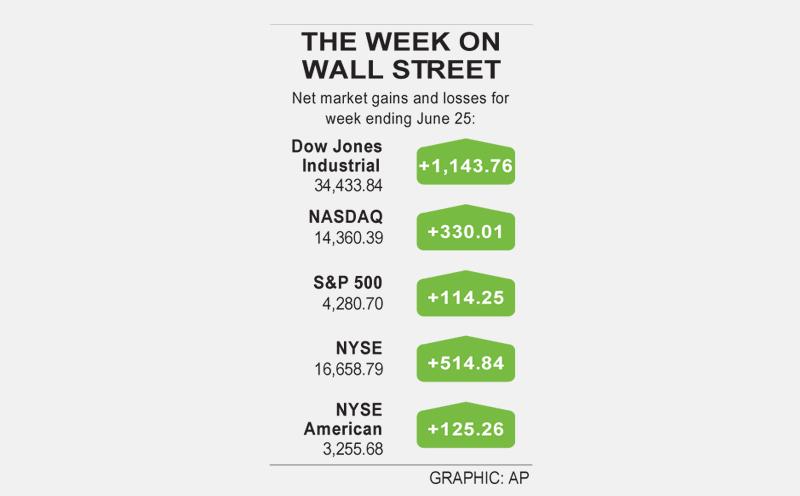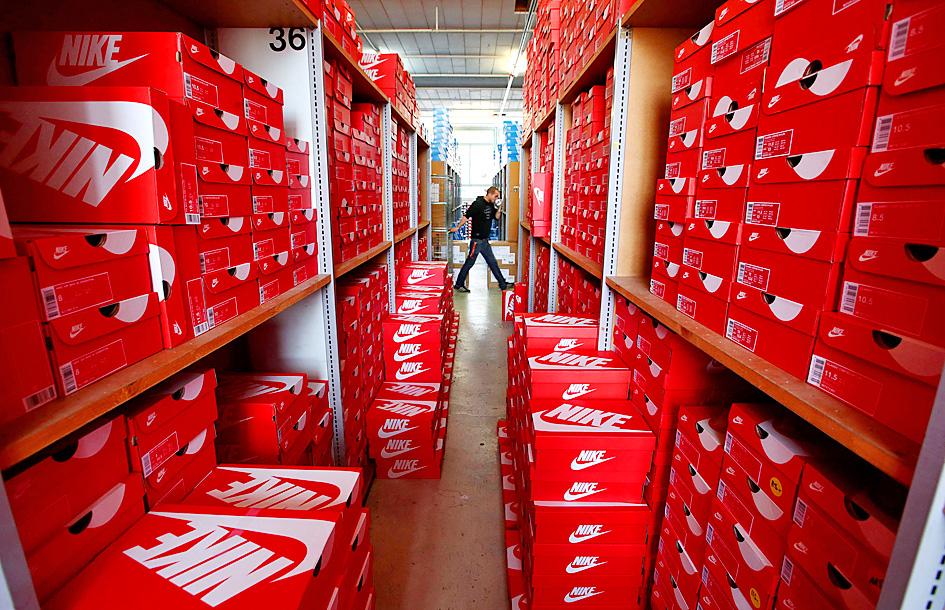The S&P 500 ended the week at record high on Friday, lifted by Nike Inc and several banks, while weaker-than-expected inflation data eased worries about a sudden tapering in stimulus by the US Federal Reserve.
Nike surged 15.5 percent to an all-time high after the sneaker maker forecast fiscal full-year sales ahead of Wall Street estimates, helping the Dow lead among the three main indices.
Bank of America Corp increased 1.9 percent and Wells Fargo & Co rallied 2.7 percent after the Fed announced that big banks have cleared stress tests and would no longer face restrictions related to the COVID-19 pandemic on buying back stock and paying dividends.

The S&P 500 Financials Sector Index rose 1.25 percent and was the top performers among 11 sector indices.
“Today is a bit of profit-taking in tech and a reallocation into the banks after the results of the stress tests,” said Dennis Dick, a proprietary trader at Bright Trading LLC, adding that he expects banks to soon announce increased dividends.
A bipartisan US Senate deal on infrastructure spending embraced by US President Joe Biden on Thursday continued to lift stocks, with the materials and industrials indices increasing and helping the S&P 500 outperform the NASDAQ.

Photo: Reuters
“The positive news from the infrastructure package favors the S&P 500 more than then NASDAQ. The NASDAQ does not pour cement into roads and put steel in bridges. That’s the S&P 500,” said Jake Dollarhide, chief executive officer of Longbow Asset Management in Tulsa, Oklahoma.
The latest personal consumption expenditures (PCE) data showed a measure of underlying inflation rose less than expected last month. Core PCE rose 3.4 percent year-on-year as expected, above the Fed’s 2 percent flexible target.
Billionaire Richard Branson’s spaceship company Virgin Galactic soared almost 40 percent and was Wall Street’s second most traded company after receiving approval from the US aviation safety regulator to fly people to space.
With the FTSE Russell reconstituting its indices following a wild trading year marked by the pandemic and “meme” stocks, volume on US exchanges surged to 15.1 billion shares, versus the 11.2 billion average over the past 20 trading days.
The Dow Jones Industrial Average rose 0.69 percent to end at 34,433.84 points, while the S&P 500 gained 0.33 percent to 4,280.7. The NASDAQ Composite dropped 0.06 percent, to 14,360.39.
For the week, the S&P 500 gained 2.74 percent, the Dow added 3.44 percent and the NASDAQ gained 2.35 percent. It was the S&P 500’s strongest week since early February and the NASDAQ’s strongest since April.
Advancing issues outnumbered declining ones on the NYSE by a 1.29-to-1 ratio; on the NASDAQ, a 1.22-to-1 ratio favored advancers.
The S&P 500 posted 32 new 52-week highs and no new lows; the NASDAQ Composite recorded 149 new highs and 14 new lows.

The Eurovision Song Contest has seen a surge in punter interest at the bookmakers, becoming a major betting event, experts said ahead of last night’s giant glamfest in Basel. “Eurovision has quietly become one of the biggest betting events of the year,” said Tomi Huttunen, senior manager of the Online Computer Finland (OCS) betting and casino platform. Betting sites have long been used to gauge which way voters might be leaning ahead of the world’s biggest televised live music event. However, bookmakers highlight a huge increase in engagement in recent years — and this year in particular. “We’ve already passed 2023’s total activity and

Nvidia Corp CEO Jensen Huang (黃仁勳) today announced that his company has selected "Beitou Shilin" in Taipei for its new Taiwan office, called Nvidia Constellation, putting an end to months of speculation. Industry sources have said that the tech giant has been eyeing the Beitou Shilin Science Park as the site of its new overseas headquarters, and speculated that the new headquarters would be built on two plots of land designated as "T17" and "T18," which span 3.89 hectares in the park. "I think it's time for us to reveal one of the largest products we've ever built," Huang said near the

BIG BUCKS: Chairman Wei is expected to receive NT$34.12 million on a proposed NT$5 cash dividend plan, while the National Development Fund would get NT$8.27 billion Taiwan Semiconductor Manufacturing Co (TSMC, 台積電), the world’s largest contract chipmaker, yesterday announced that its board of directors approved US$15.25 billion in capital appropriations for long-term expansion to meet growing demand. The funds are to be used for installing advanced technology and packaging capacity, expanding mature and specialty technology, and constructing fabs with facility systems, TSMC said in a statement. The board also approved a proposal to distribute a NT$5 cash dividend per share, based on first-quarter earnings per share of NT$13.94, it said. That surpasses the NT$4.50 dividend for the fourth quarter of last year. TSMC has said that while it is eager

China yesterday announced anti-dumping duties as high as 74.9 percent on imports of polyoxymethylene (POM) copolymers, a type of engineering plastic, from Taiwan, the US, the EU and Japan. The Chinese Ministry of Commerce’s findings conclude a probe launched in May last year, shortly after the US sharply increased tariffs on Chinese electric vehicles, computer chips and other imports. POM copolymers can partially replace metals such as copper and zinc, and have various applications, including in auto parts, electronics and medical equipment, the Chinese ministry has said. In January, it said initial investigations had determined that dumping was taking place, and implemented preliminary